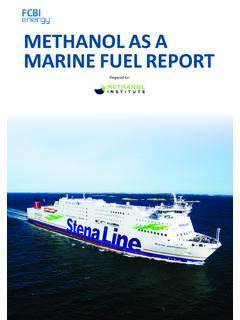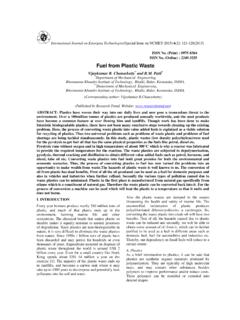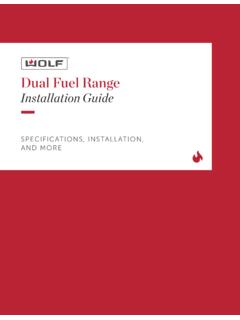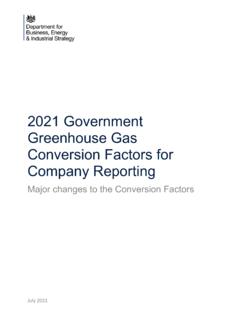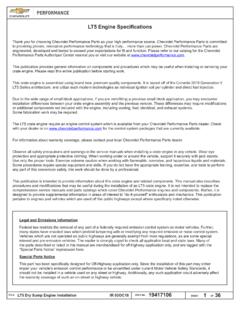Transcription of Calculating the fuel consumption of different ... - Colpron
1 Volume 30, number 3, september 2016. Calculating the fuel consumption of different types of natural gas engines compared with gas and diesel fuelled engines. As part of a project to convert a fleet of vehicles to natural gas, the evaluation of future energy consumption is an important step in the cost benefit analysis of the project. When Calculating the fuel consumption of a natural gas vehicle compared with that of a diesel or gasoline reference vehicle, there are three factors to consider: the energy efficiency of engine technologies . the respective heating values of different fuels . the conditions of use. Energy efficiency It is important to know that an engine, regardless of the type of fuel , will not have the same energy efficiency as another, depending on the technology used. This is true for diesel engines (compression ignition), where a higher compression ratio and unrestricted air flow intake provide at least 15% more energy efficiency than gasoline engines (spark ignition).
2 Currently, there are two natural gas engine technologies: spark ignition ( conversion of existing gasoline engines or Cummins Westport L, L and L engines) and induced ignition (Westport GX 15L and diesel engines with natural gas injection). Regardless of the fuel storage systems for natural gas vehicles (CNG or LNG), natural gas is always injected in gas form inside the engine. Given its extremely high octane level (>120), natural gas cannot ignite by itself by compression. It therefore needs a spark to initiate combustion, as in gasoline engines. In such a case, the energy efficiency of vehicles powered by a gasoline engine compared to vehicles with a spark ignition natural gas engine is identical (one on one comparison). For induced ignition, natural gas combustion is initiated by auto ignition through compression of a small quantity of diesel injected directly into the engine's combustion chamber. The energy efficiency of vehicles powered by a diesel engine compared to vehicles with compression ignition natural gas engine is also identical (one on one comparison).
3 Thus, in comparing the performance of a vehicle powered by a diesel engine against a vehicle powered by a natural gas spark ignition engine, we need to consider the energy efficiency of both technologies. In such a case, the natural gas vehicle will typically use about 15% more energy for the same work as its diesel counterpart, given the mechanical properties of these types of engines (see below). For calculation purposes, the following energy efficiency factors are generally used: Motorization Energy efficiency relative to the diesel fuel and % used Technology Ignition engine Diesel (100%) Dedicated Compression 1. Gasoline (100%) Dedicated Spark Natural gas (100%) Dedicated Spark Natural gas (95%) High Pressure Direct Compression (diesel pilot) 1. Diesel (5%) Injection (HDPI). Natural gas (90%) Bi fuel Spark (bi fuel ) gasoline (10%). Natural gas (30 to dual fuel Compression (diesel mix) 50%) Diesel (50 to 70%). For a natural gas and diesel mix (also called diesel blend, mixed fuel or dual fuel ), aftermarket systems cannot be optimized at the same level as when integrated by the original diesel engine manufacturer.
4 As a result, there is up to 5% more energy consumption than in an engine running on 100% diesel. The same applies to bi fuel conversions (gasoline natural gas). Heating values Unlike heating appliances, internal combustion engines cannot recover heat from water vapour generated by fuel combustion. This vapour serves no purpose in an engine, and thus is not useful to mechanical engine work. This is why the lower heating value (LHV) is taken into consideration when comparing fuels used in internal combustion engines. This can considerably alter the energy ratio, as seen in the table below. fuel Heat value Ratio with natural gas Low High LHV HHV. Diesel 34,132 Btu/litre 36,311 Btu/litre Gasoline 30,745 Btu/litre 33,059 Btu/litre Natural gas 32,330 Btu/m3 35 992 Btu/m3 Sources: (available in French only) Conditions of use and vehicle configurations Unlike conversions, in cases of vehicle replacements, the power and torque of the new vehicles will generally not be the same as that of the replaced vehicles.
5 This must be taken into account in the final fuel consumption calculation. For example, we expect to see higher energy consumption from a 12litre engine natural gas truck that had replaced a 15litre engine diesel truck pulling heavy loads (overworked engine power). However, if the power of the 15litre diesel engine was underworked, the new 12litre natural gas engine could generate an energy efficiency gain and, energy consumption would be similar. Furthermore, the vehicle's configuration (aerodynamic form, axle transmission ratio, type of tires, etc.) as well as the technological development of engines and emission standards can greatly influence the energy performance of a vehicle. However, this aspect is difficult to quantify without carrying out comparative testing between vehicles under actual operating conditions. For these reasons, and to be impartial as to the vehicle configuration chosen by the customer, this step is often omitted in the preliminary consumption calculation. However, it is clear that the cost effectiveness of a conversion project could be influenced by such variables.
6 As such, they should not be disregarded or underestimated. Calculation examples Lastly, below are some examples of consumption calculations, without taking into account the final configuration differences between vehicles: Replacement of a 12 L diesel truck by a Cummins Westport 12 L natural gas engine truck: 70,000 litres of diesel 85,287 m3 of natural gas (70,000 x 1 x ) . Replacement of a gas fuelled light truck by a natural gas light truck (dedicated engine): 10,000 litres of gas 9,500 m3 of natural gas (10,000 x ) . conversion of a gas fuelled truck with a bi fuel natural system (90% natural gas): 10,000 litres of gas 9,000 m3 of natural gas (90% x 10,000 x x 1 ) + 1,000 litres gas (10% x 10,000) . conversion of a diesel truck to a dual fuel natural gas system (45% substitution rate): 60,000 litres of diesel 30,126 m3 of natural gas (45% x 60,000 x x 1 ) + 33,000 litres of diesel (55% x 60 000) . David Ducasse, Eng. Advisor, Natural Gas Technologies for Vehicles DATECH Group, Gaz M tro Informa TECH is a publication of DATECH Group of Gaz M tro offered free of charge.
7 For further information on these topics, contact Marie Jo lle Lain , Eng., at 514 598 3444 #3507. Copyright 2016. Gaz M tro. All rights reserved | Legal notic
